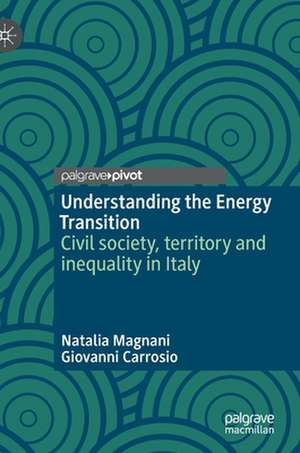Understanding the Energy Transition: Civil society, territory and inequality in Italy
Autor Natalia Magnani, Giovanni Carrosioen Limba Engleză Hardback – 23 noi 2021
Up to now this topic has been mainly addressed by the economic and engineering sciences, with a research focus on the hardware rather than on the human and social software.
However, energy systems, and the possibilities of change, are not only economic or technological but involve also patterns of social life, representations, organizational models and relational structures. In order to generate the social preconditions for the transition to a low-emission society, focused on a growing production of energy from renewable sources and on a greater sustainabilityof consumption, it is therefore urgent to reaffirm the centrality of a sociological approach to energy.
This book focused on three core research areas which are crucial to understand what is at stake with the energy transition: conflicts over the construction and location of renewable energy production plants; collective action on renewable sources that promote a new model of energy system in which consumers are also producers; and the social-territorial impact of energy policies.
Preț: 449.90 lei
Nou
Puncte Express: 675
Preț estimativ în valută:
86.10€ • 89.34$ • 71.96£
86.10€ • 89.34$ • 71.96£
Carte tipărită la comandă
Livrare economică 18 martie-01 aprilie
Preluare comenzi: 021 569.72.76
Specificații
ISBN-13: 9783030834807
ISBN-10: 3030834808
Pagini: 108
Ilustrații: IX, 103 p. 2 illus.
Dimensiuni: 148 x 210 mm
Greutate: 0.31 kg
Ediția:1st ed. 2021
Editura: Springer International Publishing
Colecția Palgrave Macmillan
Locul publicării:Cham, Switzerland
ISBN-10: 3030834808
Pagini: 108
Ilustrații: IX, 103 p. 2 illus.
Dimensiuni: 148 x 210 mm
Greutate: 0.31 kg
Ediția:1st ed. 2021
Editura: Springer International Publishing
Colecția Palgrave Macmillan
Locul publicării:Cham, Switzerland
Cuprins
Chapter 1: Introduction.- Chapter 2: The emergence of the sociology of energy.- Chapter 3. Civil society and conflicts over renewable energies beyond the NIMBY syndrome.- Chapter 4. The social and spatial (in)justice of the energy transition policies.- Chapter 5. Community renewable energies between social enterprises, social movements and hybrid networks.- Chapter 6. Some lessons on energy transition learned from the Italian case.
Notă biografică
Natalia Magnani is Senior Assistant Professor in Environmental Sociology and Territorial Sociology in the Department of Sociology and Social Research of the University of Trento, Italy. Her research interests include the energy transition, environmental conflicts, sustainable development and actor-network theory. On these topics she has published several articles in peer-reviewed journals such as Energy Policy, Energy Research & Social Science and the Journal of Rural Studies.
Giovanni Carrosio is Professor in Environmental Sociology in the Department of Social and Political Sciences of the University of Trieste, Italy. He deals with territorial inequalities and local development, investigating how the ecological transition impacts on social and territorial cohesion. Recently he has started to deal with eco-welfare, in order to integrate the readings on the environmental crisis with those on the fiscal crisis of the state.
Textul de pe ultima copertă
Natalia Magnani is Senior Assistant Professor in Environmental Sociology and Territorial Sociology in the Department of Sociology and Social Research of the University of Trento, Italy. Her research interests include the energy transition, environmental conflicts, sustainable development and actor-network theory. On these topics she has published several articles in peer-reviewed journals such as Energy Policy, Energy Research & Social Science and the Journal of Rural Studies.
Giovanni Carrosio is Professor in Environmental Sociology in the Department of Social and Political Sciences of the University of Trieste, Italy. He deals with territorial inequalities and local development, investigating how the ecological transition impacts on social and territorial cohesion. Recently he has started to deal with eco-welfare, in order to integrate the readings on the environmental crisis with those on the fiscal crisis of the state.
Giovanni Carrosio is Professor in Environmental Sociology in the Department of Social and Political Sciences of the University of Trieste, Italy. He deals with territorial inequalities and local development, investigating how the ecological transition impacts on social and territorial cohesion. Recently he has started to deal with eco-welfare, in order to integrate the readings on the environmental crisis with those on the fiscal crisis of the state.
This book focuses on the energy transition from a system predominantly based on fossil fuels to one where renewable energy is increasingly important. Through the conceptual lens of sociology, this book aims to critically look at the linkages between renewable energy, civil society, territory and inequality. Opening with a discussion of the origins of sociology’s interest in the energy issue, the book focuses on three areas of the energy transition where the relevance of social variables emerge more explicitly: conflicts over the construction and localization of renewable energy production facilities; the social-territorial impact of renewable energy policies on inequality patterns; and the emergence of forms of collective action on renewable energy promoting a new model of the energy system centered on communities and prosumers.
Caracteristici
Accessible overview of key theoretical concepts of the energy transition Explores the the social-territorial impact of energy policies Discusses the energy transition from a Southern European perspective
